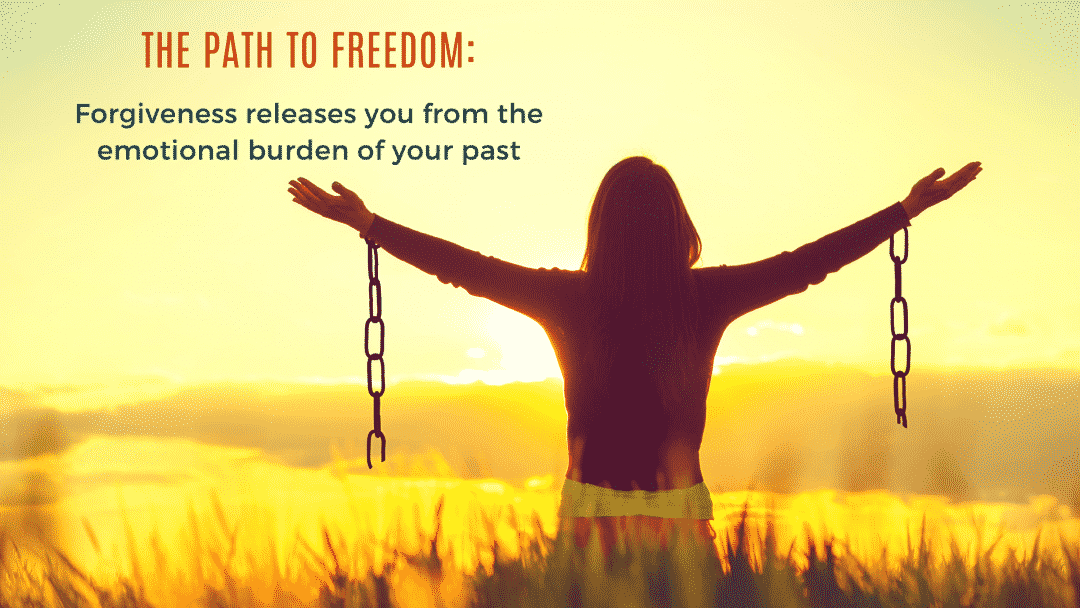
From a young age, I was taught that forgiving is good and necessary to reach the kingdom of heaven.
I cannot say for certain that forgiveness leads us to heaven, but I do know that forgiveness is the path to freedom, peace, joy, lightness, and calm.
The path to freedom is paved with gratitude and forgiveness. Forgiveness of those who have wronged us, but also forgiveness for yourself
Yet forgiveness is not an easy task. Many people skip important and necessary steps in their eagerness to put things behind them. Many forgive because they are pressured to forgive. We are conditioned to believe that forgiving and forgiving quickly is a measure of our goodness.
Forgiveness cannot be achieved until we go through a process of understanding what it is we are owed that needs forgiving, why we are doing it, and the effect it has on both the giver and the receiver. But forgiveness definitely has nothing to do with our level of goodness or righteousness.

We become addicted to anger, resentment, and hatred because these emotions make us feel alive.
On the other end of the spectrum, those who are deeply hurt often bury their emotions as a way to cope. We don’t allow ourselves to feel and we cannot heal that which we cannot feel. Forgiveness in these cases is unthinkable because we deny the event.
We demand justice, retribution, punishment, and revenge. We want the wound-giver to suffer the way we suffered. We want them to make amends and to tell us how sorry they are. If we don’t receive this, we don’t forgive.
We may unconsciously believe that as long as we hold onto the anger, our experience won’t be forgotten.
Another reason why forgiving is difficult is because we believe that if we forgive, our villain gets off the hook —and that is the last thing we want. If we forgive, we are now excusing what was done to us.
We have an insatiable need to know why. Until we get a satisfactory answer — forgiving does not seem like a fair trade-off.
The pain gives us an excuse to play the role of the victim. We get attention. We like others to witness our grief. If we forgive, we are no longer able to have others feel badly for us.
We are afraid to face our perpetrator. We are afraid that forgiving this person could send the signal to the perpetrator that he or she is free to re-enter our life.

We need to understand the depths of our pain and our loss. We must allow our feelings to be felt, so we can honor our pain. That means not rushing through our grief and definitely not being so quick to say, “I forgive you” without going through the process. This type of forgiveness is superficial and does nothing to heal you. Eventually, the anger and pain resurface to haunt you. There are six stages of grieving: denial, anger, bargaining, depression, acceptance, and meaning. Take your time to go through each stage.
Forgiving is your individual journey —not your peers’. Let go when you are ready, and never do it out of guilt or pressure from others.
Like any addiction, recognizing that we have become addicted to victimhood is important. We cannot change anything that we are not aware of. It is important to understand that forgiving the person does not mean we excuse the offense or minimize what happened to us, but it is the only way to heal what happened to us.
Realize that our inability to forgive poisons only our soul. Our inability to forgive is like cancer and like any cancer, it does not stay local with the person that wronged us. It spreads and affects all areas of our lives and those around us. It will spread to our children and our partners because it affects our mood, our behavior, and our reactions. It eats away at our personality, our inner peace, our joy, and our spirituality. Meanwhile, the perpetrator has no clue of how much we are sacrificing. In my opinion, this is a very high price to pay, would you not agree?
Understand that although you feel like the victim, there really are two —you and the wound-giver. This person will have to carry the heavy burden of their acts. While you may not see justice being served by that individual, rest assured that the laws of the Universe are unyielding, and sooner or later, we all pay for the debt and the damage we have caused. Don’t sit with the bitterness and toxicity yourself. Let it go.
Every time I speak to my students in The Gratitude Experiment about their past traumas, the first thing they say is how much they want to heal and put all their pain behind. Yet many people unconsciously block their ability to put things behind.
Why?
Because many don’t realize that not forgiving keeps us tied to the perpetrator. When we forgive, we finally let go of the energetic bond we formed with this person. You may think that by not forgetting you’re holding that person hostage but that’s not the case. You’re the only one who is a hostage. If your true desire is to move on and not let your past ruin your present and your future, make the choice to break out of that the bond you are keeping with your villain.
One common misconception is that in order to forgive we need to face the person. That is not true. You are not required to face the person that hurt you. You can do it on your own. Since forgiving is something we do for ourselves, we don’t need to face the person.
Don’t worry. Forgiving does not welcome the person back into your life. You can forgive and never have further contact with this person. It does not mean you have to love or like them. It means you break free from the chains of your emotional pain.
Being able to successfully forgive requires accepting that for whatever reason, you were chosen to undergo this experience and that you may never know the reasons why. It is about giving up the hope that the past could have been different. Learn to let go of the should haves and could haves.
Lastly, understand that forgiveness is not something you do to exonerate the other person. Forgiveness is something you do for yourself. It is a gift you give yourself.

Try to imagine for a second you are that person that hurt you. Walk in their shoes for a second and try to understand where they came from (family upbringing, nature vs. nurture) this will allow you to perhaps understand the reasons why they behaved as they did —Not to excuse but to understand. Remember, hurt people hurt other people. Damaged people cause damage to others. When you can get to a place of feeling compassion, getting to true forgiveness is possible.
Imagine the person is in front of you and get your closure. Express how they hurt you, how their actions affected your life, and tell them that although you don’t excuse them, you are choosing to let the pain go because you no longer need to stay connected to them. You don’t need anything from them. You let go of all the anger, the need for revenge because you are more important.
As you see them in front of you in your mind, become clear on what it is that hurt you. Be specific so you can forgive and let go of each wound. Many times, we use a blank statement to forgive, “I forgive you” but you must specify what it is you are forgiving. It is in the act of naming it that releases it. Often, we say we forgive for “X” offense to find out later that the feelings are still there and that is because we have not dissected the emotions.
For example, time lost, dreams unfulfilled, loss of innocence, anxiety, sleepless nights, etc. As you recall them, say them and say them out loud with your eyes closed and hand over your heart, “I forgive you for all the dreams unfulfilled, I forgive you for robbing me of my childhood right to feel protected by you” Whatever it is that happened to you say it.
Most importantly, once you feel you have made your peace and had your closure, find meaning in the event. This is what I call, finding the gift in your pain. There is always something we can learn from any event as horrific as it may have been. This is where the gratitude will help you pierce through the clouds. When you can shift your fear, anger, and loss into feelings of gratitude in your heart for the lessons, that is when your job is done.
I hope this will help bring light into the process of forgiveness. We are all on a journey and we all have many people we need to forgive, parents, partners, siblings, and friends. You are not alone on this one. The principle of divine compensation says that the universe makes sure that whatever the person that hurt you took from you in the physical world, is returned to you. The Universe holds it in trust for us what is owed or was taken from us and she finds another vehicle, person, and opportunity to bring it back to us at a later point.
Have faith that something greater always comes after the storm. When you are ready to forgive, forgive with your heart open and this will make the miracles of the Universe flow to you.
Pain, resentment, and anger close your energy and your heart from receiving. The possibilities for miracles are always there for us, for our healing, for our abundance, but if we stay in bitterness, we will not be able to access them. Forgiveness will not change your past, but it will definitely change your future.
With love and gratitude,


This article is so powerful, thank you Waleuska.
Thanks waleuska for sending this very logical article on forgiveness,you know waleuska to forgive someone who deeply hurts you is very daring and toughest task ,for this kindness your heart and mind should be more open and deep and in your article you tried to explain this issue very well,I hope many will understand
Thank you so much for sharing your thoughts, you give me comfort and hope Waleuska 🙏♥️
I love reading this often and practicing till it becomes a part of me. Thank you FMTG
Everything you write is powerful and transformational. You have taught me how to forgive properly and I now can feel better about moving on. Thank you very much. Muchisimas gracias.
Thank you so much for this article. It appeared in my inbox on a day I sorely needed it. It is a process, but this is a wonderful start for me. Blessings
This kind is very important now a day most of comminties missing forgivness
Wonderfully described, thank you 💚
Wow this is amazing and so helpful, Thank you🙏🧡
Loved this! ❤️ Thank you! 🙏🏻
Waleuska Lazo it is brilliant!
Waleuska, listening to the zoom call and now reading this has made a difference in the way I approach forgiveness.
” As you see them in front of you in your mind, become clear on what is that hurt you. Be specific so you can forgive and let go of each wound. ”
Thank you.💜
Thank you do much for sending me this at this time, as I have been battling with this exact thing for sometime.
I told my husband that i forgive him for his affair, but I feel also like how do i manage to start trusting and believing in him again with what he says and does.
So thank you
Adriene
Thankyou deeply for this you have just taught me how to really be free from forgiving and not just thinking I was forgiving because I’m desperate to be free from the pain….🧡💜💙
Amazing article!! Thank you for sharing a step by step way to forgive.. and the reminder that .. saying I forgive you.. and I’m sorry is not enough.. I need to put in the tone and follow the step R’s to really heal and find purpose for my pain. 💃🏻❤️🙏
This is so powerful. Thank you for sharing a step by step way to forgive.. and for the reminder of actually saying “I forgive you.” So very important in the healing process of our own lives.
Thank you Waleuska for this detailed engineering upon forgiveness. Myself is trying hard to forgive a person in my life who has hurted me and devastated my life by being selfish. Its being 5 years and in all these years I forgived him number of times but it always hurted me again and again ,the memories,the promises,the dreams… everything got punctured.
But after reading this,I came to know that I never forgived him in actually or in correct manner. So,thank you for this direction .
I am so glad you found this article useful.